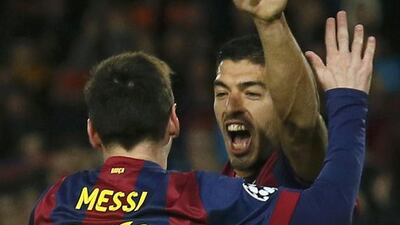BARCELONA // A big match decided by big names. On Wednesday night, Barcelona's triumvirate of South American strikers Lionel Messi, Luis Suarez and Neymar scored their side's three goals as they came from behind for a 3-1 win over a Paris Saint-Germain side who had arrived in Catalonia as the last unbeaten team from a major league.
France’s Ligue 1 is not considered to be at the same level as the top divisions in England, Germany or Spain, but the French champions had beaten Barcelona at home in October, without Zlatan Ibrahimovic in the PSG line-up.
The probability of another victory increased on Wednesday when the Swede, back to full fitness, put his side ahead against his former club after 15 minutes. Barca’s record signing when he arrived in 2009 did not appear to care that he was booed by 85,000 home fans, who took exception to his critical comments about Messi and manager Pep Guardiola in his controversial autobiography.
Luis Enrique’s Barca side were playing a formation so uncustomary that Uefa issued two versions of their interpretation.
With three defenders in a formation that shifted to a 3-4-3 but started out as 3-2-3-2, Barca were close to their beguiling best, needing a win to exit Group F as leaders and avoid a harder knockout draw.
Sceptics will still need convincing that this side is good enough to win the European Cup, more so given Real Madrid's imperious form, but it was a night when Barca's three principal strikers all combined and contributed as their manager hoped.
Neymar’s 41st-minute strike, which put his side ahead, was the pick of the goals. Afforded too much space by an otherwise astute PSG defence, he struck a curling shot from 25 yards.
Suarez created Messi’s equaliser as well as netting the third. It was only his second goal in nine games and he has yet to find the net in the six league matches since he made his Barca debut in October, but he was played in a wide position for four of those games.
The Uruguayan has been more effective in a central role in the last two matches, but Barca’s players shifted position against PSG and Messi often came deep.
A tactical obsessive, the satisfied Enrique explained his strategy.
“In 3-4-3, the wide men play very wide to fix markers and generate spaces inside,” he said. “They combine with the No 9 to get closer to goal. My plan was to accumulate as many players as possible in attack to unbalance the opponent. It’s true that they had chances, but that happens against any very big rivals.”
Barca’s Johan Cruyff-inspired 4-3-3 formation, later perfected by Guardiola, has been considered sacrosanct, but Enrique explained his reason for departing from it.
“Regardless of the model we use, the football philosophy is same, to look for passing lines and to attack and defend as a block,” he said. “This is not done thinking of what opponent can do to us, but how we can damage them.
“That’s how we decide which model we’ll use. We knew where we could do them damage, where to find space, and how we could get our decisive players into the game.”
The contrasting figures of Messi and Ibrahimovic, who did not enjoy a harmonious relationship together at Camp Nou, embraced at the end of an entertaining encounter.
As group winners, Barca earned home advantage in the second leg of the first knockout stage. If Enrique can get what the Spanish media refer to as his “South American trident” right, then Barca will feel confident of beating any side in the world.
sports@thenational.ae
Follow us on Twitter at @SprtNationalUAE


